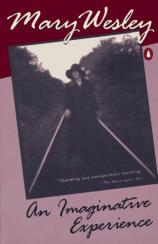Reading Group Guide
Discussion Questions
An Imaginative Experience

1. Clodagh and Madge blame Julia for Giles' and Christy's deaths, and Julia herself says to the sympathetic priest, "Don't you see? I am responsible. If I had been sensible and bloody-minded, Christy would be alive now." Does she in fact bear any responsibility? Is her desire to "celebrate" Giles' death (as she struggles to blot out Christy's) reprehensible? Considering that she was abandoned physically by her father and emotionally by her mother, where does Julia's moral center come from?
2. Other than "the impression of a white face, black eyes, squared mouth shouting at the guard, and brown hair ruffled by the wind," no physical description is given of Julia. Even less is said about what Sylvester looks like. Mary Wesley says she deliberately left Sylvester's and Julia's appearances to the reader's imagination. How do you see them? In the absence of specifics, how and why does a reader form a mental picture of the different characters? What sort of cues are most important?
3. Sylvester calls Julia "a wounded person," and Mr. Patel describes Sylvester as "a gentlemen with nothing to hold." Certainly both have been damaged by their experiences of love. How do you think this will affect their own relationship? Does each have the capacity to love deeply again? What might the future hold for them?
4. "I think Celia has been utterly outrageous," says Rebecca, "and I am a feminist." Mary Wesley says wryly, "I don't really know what a feminist is but I often meet people who claim to be one." Complaining that "feminists in this country [England] can be unnecessarily aggressive, which I find tiresome," she nevertheless agreed with the definition of a feminist as someone who believes a man and a woman should receive equal pay for equal work, and pointed out that "the word has become almost a term of abuse, in some way." Do you agree? How would your group define "feminist?" What do you think it means to Rebecca? Would Julia qualify?
5. Sylvester decides that he'd confused love with lust, and married for lust. How do those two factors play out in Julia's marriage? How about in Clodagh's affair with Giles?
6.An Imaginative Experiencecontains a number of entertaining secondary characters who make use of Sylvester's and Julia's misadventures for their own purposes. Are they benign or not? Does Rebecca really think she has Sylvester's best interests at heart? What motivates Maurice Benson? How about Madge? Do these characters remind you of real people, or are they exaggerated? Do Rebecca and Maurice deserve each other?
7. After running into Rebecca dancing at the wild Christmas party, Sylvester comments, "If I put all these connections and meetings into my novel, nobody would believe it. Too contrived, they'd say. Things like that do not happen in real life. It's a rotten, rotten book." Julia responds, "But they do." Do you agree with Julia? If indeed the author feels it runs the risk of making An Imaginative Experience a "rotten, rotten book," why does coincidence play such a considerable part in the story? Is that a strength or a weakness?
8. Do you know what a "twitcher" is? How about a "lurcher?" (A twitcher is a birdwatcher, and a lurcher, says Wesley, "a kind of dog.") Does it matter?
9. A theme in the novel is racial tolerance, exemplified by Julia's compassionate friendship with the Patels (as well as by Janet's increasing intolerance of Tim's racist remarks). What does the presence of this gentle, humorous family add to the novel? How would it be different if they were not Asian? Despite Mary Wesley's aversion to dispensing advice, could a novel be considered an effective way of doing exactly that?
An Imaginative Experience
- Publication Date: April 1, 1996
- Paperback: 224 pages
- Publisher: Penguin (Non-Classics)
- ISBN-10: 0140247491
- ISBN-13: 9780140247497






